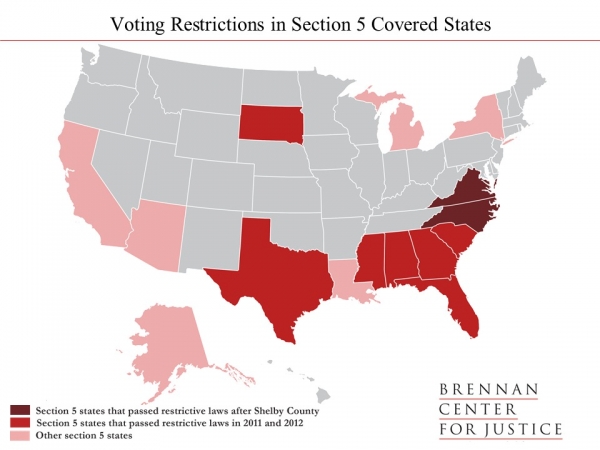The film Selma movingly chronicles Martin Luther King Jr.’s fight to win the Voting Rights Act (VRA). It ends with King speaking triumphantly on the steps of the Alabama capitol, after marching from Selma to Montgomery. Five months later, Congress passed the VRA, the most important civil-rights law of the twentieth century.
If only that story had a happy ending today. Selma has been released at a time when voting rights are facing the most sustained attack since 1965. The Supreme Court gutted the centerpiece of the VRA in Shelby County v. Holder in June 2013. That followed a period from 2011 to 2012 when 180 new voting restrictions were introduced in 41 states, and 22 states made it harder to vote.

Last year, on King’s birthday, a bipartisan coalition in Congress introduced a legislative fix for the Shelby decision, restoring the requirement that states with the worst record of voting discrimination have to clear their voting changes with the federal government. The Voting Rights Amendment Act of 2014 (VRAA) was an imperfect piece of legislation, but voting rights advocates viewed it as a good first step toward protecting voting rights.
Despite the overwhelming reauthorization of the VRA in 2006—390-33 in the House, 98-0 in the Senate, signed by President Bush—few Republicans stepped forward to sponsor the VRAA in Congress. There are eleven Republican co-sponsors in the House but none in the Senate, even though every Senate Republican voted for the VRA eight years ago. Congress held a few hearings, but nothing came of it.
This week, House Judiciary Chairman Bob Goodlatte, who voted for the VRA in 2006, reiterated his opposition to strengthening the law. “There are still very, very strong protections in the Voting Rights Act in the area that the Supreme Court ruled on,” Goodlatte said. “To this point we have not seen a process forward that is necessary because we believe the Voting Rights Act provided substantial protection in this area right now.” (Nancy Pelosi said it was “offensive,” especially in the wake of the Steve Scalise scandal, that GOP leaders were not pushing the bill.)
Popular
"swipe left below to view more authors"Swipe →
But recent evidence shows that a gutted VRA has provided scant protection to voters. Consider what has happened since the Supreme Court invalidated Section 4 of the VRA in Shelby County:
A month after the Shelby decision, North Carolina passed the most sweeping voting restrictions in the country. Key provisions of the law were upheld by a district court and reaffirmed by the Supreme Court for the 2014 election. As Ruth Bader Ginsburg noted in her dissent, “these measures likely would not have survived federal preclearance.”
Texas’s voter ID law, the strictest in the country, was struck down before the Shelby decision and again in a second trial last year, when a district court called it an “unconstitutional poll tax.” But the law was reinstated by the appeals court and, as in North Carolina, upheld by the Supreme Court. As a result, a law that has twice been struck down as discriminatory remains on the books.
Four major voting rights cases, from Ohio, Wisconsin, North Carolina and Texas, reached the Supreme Court before the 2014 election, and in three of four cases the Supreme Court declined to block the new voting restrictions. The one success story, the Court’s decision to halt Wisconsin’s voter ID law for 2014, was only temporary, and the ACLU has asked the Supreme Court to consider the merits of the law.
Since 2010, nearly two-thirds of the states previously covered under Section 4 have passed new limits on voting rights. Voters in fourteen states faced new restrictions for the first time in 2014. There were many documented cases of longtime voters who were turned away from the polls in states like North Carolina and Texas because of the new laws.

No doubt many in Congress will praise Dr. King during his annual holiday and celebrate the accomplishments of the VRA on its fiftieth anniversary. But those words will ring hollow unless they honor King’s legacy by working to protect voting rights and strengthen the VRA.


